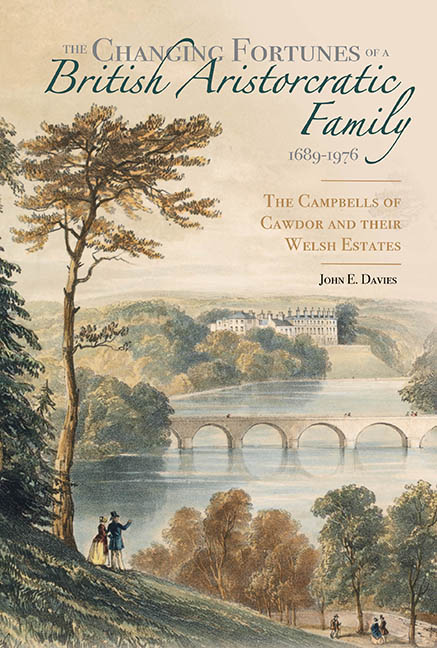 The Changing Fortunes of a British Aristocratic Family, 1689–1976
The Changing Fortunes of a British Aristocratic Family, 1689–1976 Book contents
- Frontmatter
- Contents
- List of Illustrations
- Acknowledgements
- List of Abbreviations
- Pedigree
- Introduction
- 1 Cawdor and Campbell
- 2 Estate Administration
- 3 The Agricultural Estate: The Cawdors as Farmers and Landlords
- 4 The Cawdors as Industrial Landowners
- 5 The Cawdors in the Community: Church and Education
- 6 The Mêlée of Local Governance
- 7 The Cawdors in Politics: Interest Building, Consolidation and Decline
- 8 Private and Exclusive Lives
- 9 The End of the Welsh Estates
- Conclusion
- Bibliography
- Index
6 - The Mêlée of Local Governance
Published online by Cambridge University Press: 21 March 2020
- Frontmatter
- Contents
- List of Illustrations
- Acknowledgements
- List of Abbreviations
- Pedigree
- Introduction
- 1 Cawdor and Campbell
- 2 Estate Administration
- 3 The Agricultural Estate: The Cawdors as Farmers and Landlords
- 4 The Cawdors as Industrial Landowners
- 5 The Cawdors in the Community: Church and Education
- 6 The Mêlée of Local Governance
- 7 The Cawdors in Politics: Interest Building, Consolidation and Decline
- 8 Private and Exclusive Lives
- 9 The End of the Welsh Estates
- Conclusion
- Bibliography
- Index
Summary
The previous chapter demonstrated the concern of the Cawdors to uphold the position of the established Anglican church and its schools within their sphere of influence. However, the Cawdors, as leaders of their community by virtue of their being the largest landowners of the region, also involved themselves, in varying degrees, in the paternalistic management of local government, even as that paternalism was being eroded during the nineteenth century, as semi-democratic bodies were established to deal with specific matters. However, if their paternalistic management of the region, together with their support in improving the local infrastructure, tended to benefit the area as a whole, it must not be overlooked, of course, that a proper attention to local administration helped to cultivate parliamentary constituencies and ensure that at a local level the Cawdors maintained their hegemony.
In Scotland, the Campbells had been involved with local government since the thanage had been granted to them in the late thirteenth century. Additionally the family had been vested with the hereditary offices of ‘sheriff of the county and constable of the royal castle of Nairn’ since at least the beginning of the fifteenth century, influential and powerful offices which they held until 1747 when these offices were abolished. By then the Campbells had been settled in Wales for over half a century, though it was not until the late eighteenth century that they began to show a more than superficial interest in obtaining a measure of local government influence. Only with John, later first baron Cawdor, do we see a Campbell obtaining local office, first as an active justice of the peace, and then, in 1808, as mayor of Carmarthen. The baron also had local influence as a lieutenant-colonel in the Carmarthenshire militia, and as a captain in the Castlemartin yeomanry.
Nonetheless, in the eighteenth and first half of the nineteenth centuries the lord lieutenancy was at the top of the local government hierarchy, an office which ‘had one foot in London close to central government and the other planted firmly in the county’. The Cawdors failed to reach this peak until the mid-nineteenth century, by which time the lieutenancy had lost much of its political influence.
- Type
- Chapter
- Information
- The Changing Fortunes of a British Aristocratic Family, 1689–1976The Campbells of Cawdor and their Welsh Estates, pp. 171 - 198Publisher: Boydell & BrewerPrint publication year: 2020


